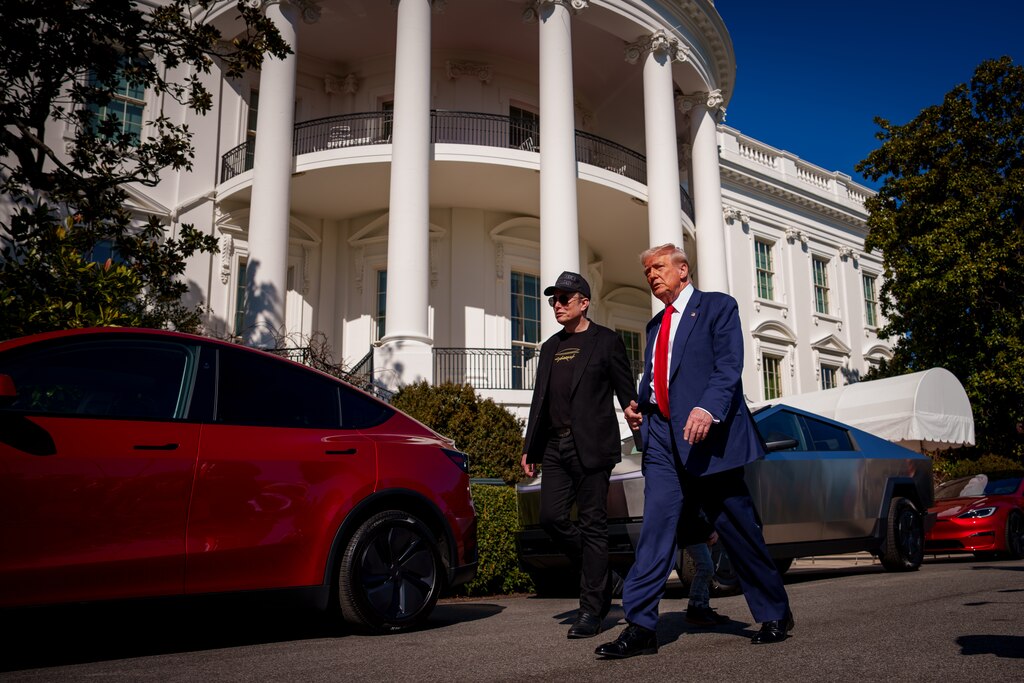People always saw Lindsay and Cadeem Franklin as the prototypical young, progressive couple who cared about their carbon footprint: They compost, have backyard chickens and drive electric vehicles.
Oh, how perceptions can change.
“I went from getting looks while in the car, like, ’All right, Black man, I see you doing all right, nice car, doing things,” said Cadeem Franklin, 30. “Now, I just had a lady in the Sprouts parking lot giving me a mean mug the other day.”
They have been a Tesla household for years, zipping along in a Model Y and a Model 3. But after CEO Elon Musk teamed up with President Donald Trump to slash the federal government, conversations about who would get the home charger for the night turned into musings about selling their cars.
The Baltimore Banner thanks its sponsors. Become one.
“It’s an embarrassing feeling ... you get this look from people while you’re driving, like, ‘Where do you stand?” said Lindsay Franklin, 28.
In a matter of months, Tesla, the top-selling EV manufacturer on the U.S. market, swerved from environmentally friendly, techie darling to progressive pariah.
Read More
Now, some Tesla drivers are navigating what it means — or doesn’t — to own one, and what it would cost to sell amid a financial reality shaken by tariffs, volatile markets and inflation.
More than 50,000 Marylanders drive Teslas, which make up more than 40% of all electric vehicles registered in the state, according to data provided by the Motor Vehicle Administration. Other manufacturers don’t even come close.
The most strident critics of Musk and Tesla, even some who were once supporters of the electric vehicle manufacturer, are urging owners to ditch their cars and asking shareholders to dump their stock as a stand against Musk’s involvement in the government.
The Baltimore Banner thanks its sponsors. Become one.
Peaceful protests have erupted worldwide, the Baltimore region included. There have been reports of violent vandalism, which the U.S. Department of Justice has vowed to pursue as domestic terrorism. And some owners are slapping “I bought this before we knew Elon was crazy” bumper stickers on their Teslas.
Cadeem Franklin is in the process of selling his Tesla. But other owners say they don’t plan to, preferring to keep politics out of the driver’s seat.
“If I want to be done with Elon, I have to be done with EVs,” Cadeem Franklin said. He works in the auto industry and doesn’t know of another EV that would fit his budget and needs.
Lindsay Franklin already sold hers. She bought a Subaru to replace it. A gas-powered one.
Brand in crisis
Tesla reported Tuesday that its profits in the first three months of this year plummeted 71% compared to the first quarter of last year. Its shares have lost about half their value since mid-December.
The Baltimore Banner thanks its sponsors. Become one.
The company said a drop in the number of vehicles sold and weaker selling prices (thanks to generous sales promotions) hurt its bottom line.
Its newest product, the Cybertruck — a boxy model that seems to say, “We’ve made shipping containers into houses, why not vehicles?” — hasn’t sold as well as expected and faced a safety recall in March.
Analysts have attributed Tesla’s struggles to a stale product line and to the reputation hit the company is taking as its CEO embraces his status as a right-wing darling. In the earnings call Tuesday, Musk acknowledged “some blowback” to his role in the administration and said that beginning next month he would step back from the government and allocate “far more” time to Tesla.
Trump tapped Musk, one of his biggest campaign supporters, to lead the newly created Department of Government Efficiency, or DOGE.
Since Inauguration Day, DOGE crews have been embedding at agencies and imposing spending cuts.
The Baltimore Banner thanks its sponsors. Become one.
Republicans have lauded the effort, calling it a way to save taxpayer money by trimming a bloated bureaucracy. Democrats have characterized Musk as an unelected oligarch running amok in Washington.
Though Lindsay Franklin said she started rethinking her Tesla when Musk bought Twitter, which he renamed X, DOGE’s actions were the “nail in the coffin.”
 President Donald Trump and Elon Musk stroll after showing off Tesla vehicles on the South Lawn of the White House in March.
President Donald Trump and Elon Musk stroll after showing off Tesla vehicles on the South Lawn of the White House in March.She has family and friends who work(ed) government jobs. She was making monthly payments on her Tesla while people in her close circle were wondering when their next paychecks would come.
“Am I going to pay this much for my monthly payment when I don’t align with the brand, when I don’t align with the morals of the company and we’re in this kind of political climate?” she asked.
Protesters around the world have rallied behind the cry, “Hit him where it hurts,” arguing that the way to fight back against Musk, the richest man in the world, is to go after his bottom line.
The Baltimore Banner thanks its sponsors. Become one.
On recent Saturday mornings, the Tesla dealership on Reisterstown Road in Owings Mills has been a staging ground for cacophony of car horns, chants and music.
The “mean mugs” and middle fingers that the Franklins and others have experienced aside, some protestors say their gripe is with Musk, not with individual Tesla owners.
“I really don’t blame people who own Teslas,” said Alan Cohen, 67, during one Reisterstown protest last month. He said he is “outraged and appalled” at what Musk is doing in the federal government, but understands what Tesla owners may be going through. He used to love the company, he said.
Others may have less car compassion — or at least express it differently. On that same Saturday, as one Tesla pulled into the dealership, a protester noticed the window was down.
“Sell your car!” the man screamed.
The Baltimore Banner thanks its sponsors. Become one.
Best in class
There’s a problem for some “Tesla Takedown” protesters: The company makes some of the all-around best EVs for the price.
When Anthony Dominijanni, 33, bought his Tesla Model 3 last year, it was “all practicality,” he said.
He’s a scientist, a left-brainer who appreciates good tech. Dominijanni did extensive research into the EV market — considering range, performance, the ubiquity of chargers and, of course, price: The decision came down to the Model 3 or the Ford Mustang Mach-E.
The Tesla qualified for the full $7,500 federal tax credit; the Ford didn’t. Vehicles have to go through final assembly in the United States to qualify, and Dominijanni was surprised to find out that the car from Ford, perhaps the most iconic U.S. car brand in history, is less “American-made” in some ways than the Tesla.
And purely on performance merits, he said he hasn’t regretted the decision.
The ride is smooth and the assisted self-driving still amazes him, he said. The range is great, and Tesla chargers are everywhere. He has taken it on long trips without worrying where he can plug in to recharge. He has the Tesla auto insurance plan, which he said costs him roughly half of what outside agents quoted him.
“When I bought it, I thought I was doing a good thing,” Dominijanni said. He was a part of the transition toward a greener economy and was supporting a U.S. car company.
He just bought the car last year, and he estimates he’d lose about $10,000 in a resale. Yet he said he wouldn’t buy the car today if he had the choice.
Since January, the middle fingers have come for him, too.
People ask him about the car all the time. Left-leaning friends and acquaintances grill him with questions. Friends and acquaintances on the right try to get “buddy, buddy” about it, he said. Both make him uncomfortable.
“It’s exhausting,” he said.
For Dominijanni and the Franklins, the past few months have raised questions about what it means to be an ethical consumer.
“When you start to make these arguments, how far do you take them? Like, do you have an iPhone? Do you know everything about Apple and the CEO ... and where they’re sourcing their materials?” Dominijanni said. “Same thing with a watch that you’re wearing, pants that you’re wearing. Where does it stop?”
Even for EVs, Lindsay Franklin wonders about how the electricity is produced. Is that always sustainable? Would it be better to just take the bus everywhere? But what if she can’t do that?
And then there are the minerals that go into EV batteries. When Dominijanni told a friend from Africa that he bought a Tesla, the friend told him, “You’re ruining our people.”
Though other companies are making huge technological leaps and gaining ground, Tesla is still the U.S. standard. Chinese manufacturer BYD has surpassed Tesla in terms of worldwide sales, according to news reports, but their vehicles aren’t available in the U.S.
Tesla has made massive investments in charging infrastructure, meaning its cars are likely to remain a staple of the U.S. EV market.
And Musk himself is hard to avoid. In addition to his leadership of DOGE, X and Tesla, he also helms SpaceX, which launches rockets and satellites.
Baltimore Banner reporter Greg Morton contributed to this article.
An earlier version of this article said Subaru's internet system is powered by Musk's Starlink. While the car's onboard system is called Starlink, it isn't associated with the Musk company of the same name.




Comments
Welcome to The Banner's subscriber-only commenting community. Please review our community guidelines.